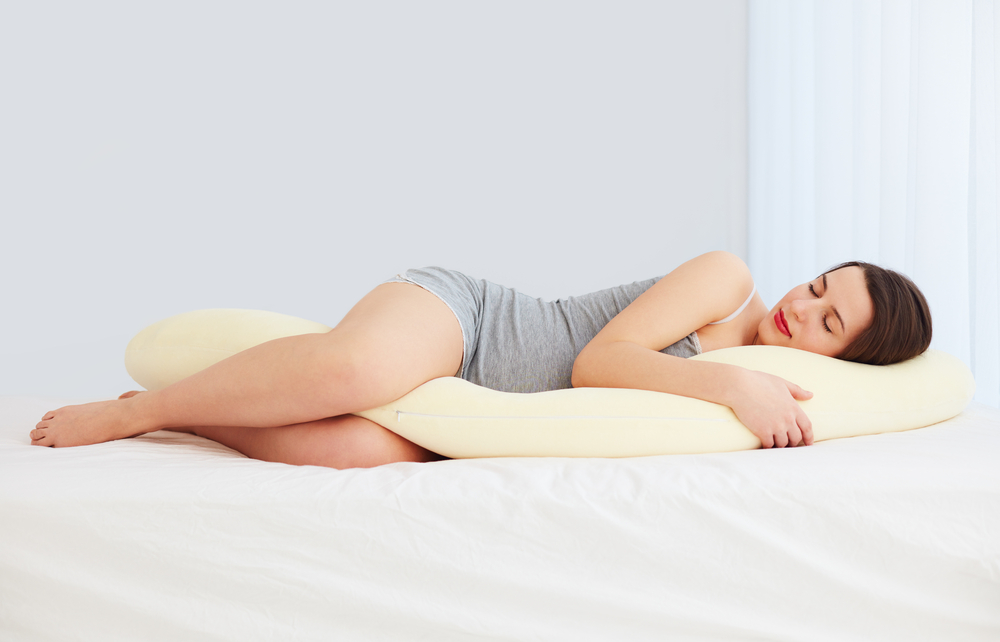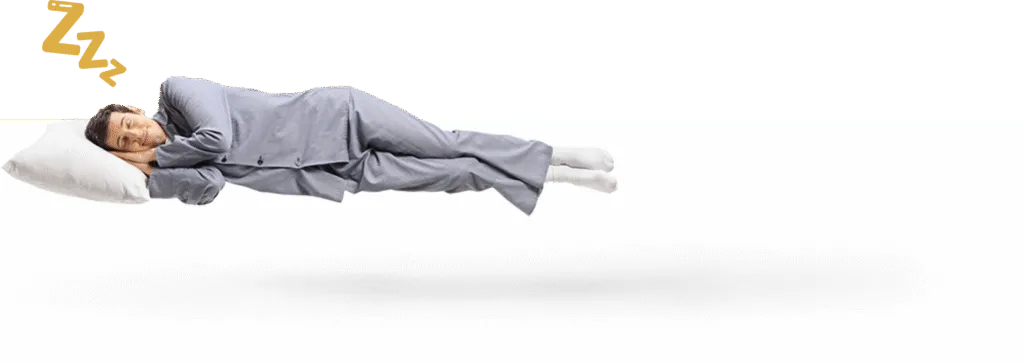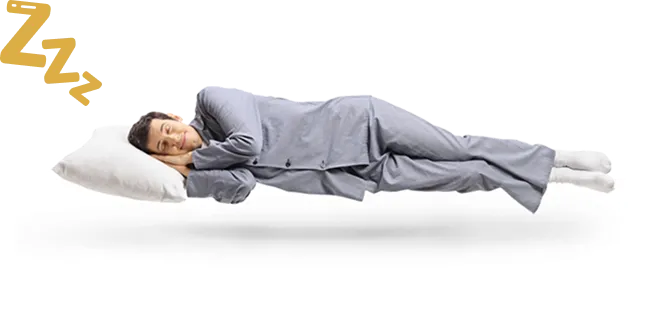Relaxation Techniques for a Calm Night
July 2024Tips for Sleep Anxiety
Getting enough sleep is extremely important for both our mental and physical health. If you don’t get enough sleep, you could face problems like a lack of concentration, a decrease in cognitive function and, surprisingly, a shorter life expectancy. It’s therefore alarming to learn that about 35% of people in the UK struggle to get sleep as a result of some form of sleep anxiety.
Suffering from sleep anxiety can be a devastating and challenging experience, and it is often misunderstood. It is a serious health risk… but there are proven techniques that you can adopt to combat it. We hope the tips that we’ll give you in this article will be beneficial, but if your symptoms still persist then we strongly advise you to seek advice from a qualified medical professional.
What Is Sleep Anxiety?
To put it simply, sleep anxiety is a fear or worry about going to sleep. Many of us worry a little about not being able to go to sleep. However, having a distinct phobia of sleep is completely different. This condition is called “Somniphobia”. Sleep anxiety is like a lot of other forms of anxiety; it is a form of performance anxiety. It involves a cycle of anxious thoughts before going to bed, many of which involve some form of unease, nervousness and worry.
Exactly what causes sleep anxiety is largely unknown. Some theorise that because there are dozens of activities and ways to engage yourself during the day, you can keep some of your anxiety away until the evening. But at night, your mind is significantly less occupied, meaning these feelings will come flooding back.
Some people suffer from chronic anxiety, meaning they suffer from anxiety all of the time, so trouble getting to sleep is just a byproduct of that. Others think there can be a direct link between sleep anxiety and some kind of sleep-related trauma.
A combination of insomnia and anxiety can also be caused by hyperthyroidism, which is a condition that causes your thyroid to be overactive, meaning there is too much thyroid hormone in your bloodstream. This is a well-known cause of sleep dysfunction.
Various research has shown a close connection between sleep and anxiety. Anxiety can cause sleep problems, making it hard to fall asleep, while sleep deprivation can exacerbate anxiety. This cycle can lead some people to dread bedtime and feel increasingly sleep-deprived. Other researchers have found that lack of sleep activates the brain regions that are responsible for excessive worry, further heightening anxiety and making restful sleep even more difficult to achieve.
Symptoms of Sleep Anxiety
If you suffer from sleep anxiety, you may experience certain emotional or behavioural symptoms, which may include:
- Irritability
- Nervousness
- Restlessness
- Sense of impending danger
- Feelings of being overwhelmed
- Trouble concentrating
- Fast heart rate
- Digestive problems
- Rapid breathing
- Sweating
- Trembling
- Tense Muscles
- Reduction in Cognitive Function
- Higher risk of developing Type 2 Diabetes
Tips To Overcome Sleep Anxiety
Now that we all have a better understanding of sleep anxiety and what it entails, let’s look at ways to help overcome anxiety at bedtime and have a calm and relaxing night’s sleep.
Limit Your Screen Time
If you want the best chance of getting a good night’s sleep, you must limit your screen time. Screens such as laptops, phones and tablets emit blue light that tricks the brain into thinking the sun is up, which suppresses melatonin. This is why you should do everything in your power to avoid using screens before bed.
Many of us live on our phones, so putting them down is sometimes easier said than done. If you absolutely have to use a screen before bed, you should consider using a blue light filter to minimise the amount of stimulating blue light that you are exposed to before hitting the hay.


Limit Your Caffeine Intake
Many of us struggle to function without caffeine. The thought of tackling the trials and tribulations of the day before having your morning cuppa is unthinkable to many people. However, caffeine can greatly affect your sleep.
The effects of caffeine can last for several hours, even up to days after consumption, so the chances of it affecting your sleep are significant. Caffeine can amplify negative thoughts and set your mind racing, making it harder and harder to sleep. Excessive caffeine consumption also increases the risk of awakening in the night, further disturbing your night’s rest.
Try To Avoid Alcohol
While on the subject of limiting things, you should also limit your alcohol intake before bed. Studies have shown that alcohol consumption can exacerbate anxiety disorders. This can make it incredibly challenging to sleep.
While alcohol can initially make you feel sleepy, it can amp up anxiety and lead to poorer quality of sleep. Experts have advised that alcohol disrupts what is known as sleep architecture. As we sleep, we go through normal phases of deeper and lighter sleep. A night of drinking can fragment this pattern, leaving you feeling disoriented and tired when you awake.
Avoid Lying In Bed Awake
We have all been guilty of lying in bed and not going to sleep. But this is more than an inconvenience; it can seriously harm your ability to sleep. Lying in bed without sleeping allows your thoughts to race and spiral out of control, not to mention the fact that you are inadvertently normalising lying in bed without sleep. This is also why some experts advise trying to limit being in bed to only when you are sleeping. If you are struggling to sleep and you consistently lie in bed, you’re almost tricking your brain into thinking that it’s not a place to sleep.
If you are lying in bed for longer than 20 minutes and find that you still can’t sleep, it may be time to give yourself a do-over. While it may seem counterintuitive to get out of bed when you are trying to sleep, re-enacting your routine has proven extremely effective when it comes to helping you relax and get some much-needed shut-eye. And speaking of routines…
Establish A Bedtime Routine and Practise Good Sleep Hygiene
Establishing a bedtime routine has proven extremely effective when it comes to helping you relax and preparing you mentally for your night’s sleep. Your routine can encompass all kinds of relaxing practices; the main thing is that it works for you. No matter whether you think brushing your teeth and washing your face helps you relax because it makes you feel clean and ready for bed, or if you prefer to listen to soothing music, the most important thing is that your routine helps you.
Establishing an effective bedtime routine is part of the broader spectrum of practising good sleep hygiene. Contrary to popular belief, sleep hygiene is not just about sleeping in clean and hygienic conditions such as fresh bed sheets (although if changing your bedsheets more frequently works better for you, then that’s great!); it also refers to practises that enable a good night’s sleep. Some of the ways to practise good sleep hygiene include soaking up the morning sun, keeping your bedroom dark and cool and going to sleep around the same time every night.
Try To Exercise More
We know that exercise can be good for you. What is less widely known is the fact that exercise can help you sleep better.
Exercise can help to tire you out, both physically and mentally, making it much easier for those of you who find yourself with too much pumped-up energy. On top of that, exercise is said to reduce the production of stress hormones.
Studies have shown that regular exercise can help you fall asleep faster and more soundly. Even moderate-intensity exercise (such as a brisk walk) has proven to be very effective when it comes to helping with chronic insomnia.
Some people find that incorporating a workout as part of their bedtime routine helps them to sleep better, while others find it’s too much effort, so they prefer to perform a morning or afternoon workout. Regardless of when you prefer to exercise, engaging in exercise can be extremely beneficial to your sleep.
Avoid Stressful Activities Before Bedtime
Many psychotherapists highlight the need for creating some form of transition between daytime and nighttime. One of the best ways to do this is to avoid activities which are thought to be stressful.
While it may sound obvious, it is surprising how many people forget about this. You should avoid playing video games that may get you pumped up and avoid tasks such as stressful puzzles that may get you wracking your brain looking for hard-to-find solutions. The goal is to reduce the nervousness and thoughts in your head around bedtime, creating a buffer between your rested mind and stressful activities.
Meditation
Meditation has been proven to help sleep anxiety. Research indicates that diaphragmatic breathing relaxation techniques can significantly reduce anxiety before bedtime.
Begin with a few minutes of sitting quietly, focusing on your breathing. Learning to quiet your mind and meditate can help you to manage stress both during the day and before bed. If meditating is challenging, you may wish to try some relaxing yoga poses to help your body prepare for sleep. This can help to tire you out physically and mentally.
Limit Naptime
Who doesn’t love a nap? Naps can help us catch up on our sleep and it can make us feel more refreshed. However, naps can also severely hinder our sleep and, more specifically, our sleeping patterns. Long naps are even more troublesome when it comes to sleep. The longer you sleep, the further into the sleep cycle you get, so awakening from it becomes more difficult, not to mention it tricks your body into thinking you have had your sleep for the day.
So, if you are having trouble sleeping, consider skipping naps. This way, your body will be more tired and you will get a better night’s sleep.
Create A Sleep Environment
Creating a perfect sleeping environment is essential for ensuring you get the perfect night’s sleep. Controlling light, sound and temperature in your bedroom can increase the likelihood of you getting some good sleep. A sleep-friendly environment should be cool, dark and, above all else, quiet. The ideal sleeping temperature is advised to be between 15 to 20 degrees.
If you find that lights are keeping you awake, try dimmable glow lights. Also, if you find that noise (or sometimes lack of noise) is keeping you awake, try to have white noise in the background. There are all manner of white noise playlists available online for you to take advantage of.


Get A Great Night Sleep With John Ryan By Design
Of course, we’d also be remiss if we didn’t point out that having a comfortable and supportive mattress is another key to enjoying a great night’s sleep. At John Ryan, we stock all manner of high-quality mattresses. So, if you think that your mattress could be contributing to your poor sleep quality (even if it’s only in part) then why don’t you browse our excellent range and see if you could find something that suits you better? And if you have any questions about our products, please don’t hesitate to contact us. Our friendly team of experts will be more than happy to listen to your requirements and help you to choose the mattress that will work best for you.

Dreaming of the perfect nights sleep?

Ask us a question
There are over 6000 questions and answers submitted by you on all questions about mattresses and bed problems. Enter a keyword such as Vi Spring, John Lewis beds, bad back or Memory Foam and see if your question has already been answered.
If you can’t find an answer in knowledge hub, ask a new question. We aim to respond to all questions within one working day.
Newsletter
Enter your email to join our newsletter. We’ll send you occasional news and mattress expertise.
